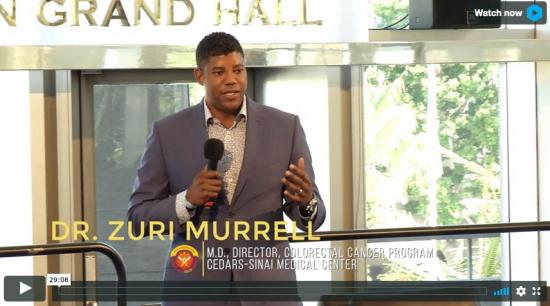
Colon Cancer Awareness Month – VIDEO: Dr. Zuri Murrell on Why Current Prevention Standards Aren’t Enough
Dr. Zuri Murrell, a leading Los Angeles colorectal surgeon and specialist, has said, “Colorectal cancer is a disease that can be almost totally prevented through proper nutrition and also through screening. So, it’s something that people don’t have to get but if you do get it, it can still be cured if caught early.”
Since colorectal cancers are the second most common cancers in the United States, it’s a good idea to know what causes it and what symptoms to be alert to. Regularly scheduled colonoscopy exams, particularly after the age of 50, is strongly advised.
What is Colon Cancer?
Colon cancer is found in the large intestines, while rectal cancer resides in the last several inches of the colon. They are often referred together as “colorectal.” It is common for colorectal cancer to begin as a small polyp that has no symptoms until well advanced and cancerous. This is why regular screenings are so important, particularly if you have a family history of cancer or have any other form of cancer in the past.
Causes and Risk Factors
Almost all colorectal cancers begin in glandular cells found in the innermost lining of the colon and rectum and then slowly progress through the outer layers. While the exact reasons cancer develops in some people and not in others is still being researched, much work has already been done to determine risk factors – anything that increases your chances of getting cancer. Some of the key risk factors:
- A family history of colon cancer or polyps.
- Being way overweight, particularly around the waistline
- Physical inactivity
- Heavy red meat and processed meat diets
- Smoking tobacco
- Heavy alcohol consumption: More than two drinks a day for men and one for women.
- Being older than 50
- History of inflammatory bowel disease
- Having an inherited syndrome such as Lynch syndrome and familial adenomatous polyposis
- Type 2 diabetes
Symptoms of Colon Cancer
Colon cancer symptoms are slow to develop. Keep in mind that these symptoms may have other causes but if you have any of them, it is best to get examined.
- Rectal bleeding or blood in stool
- Change in bowel habits: stool consistency, diarrhea, or constipation
- Persistent abdominal pain such as coming from cramps or gas
- Bowels don’t empty entirely
- General weakness, tiredness or sudden weight loss
Why Choose Dr. Zuri Murrell for Your Colonoscopy?
If you are over 50 or you have some of the cancer risk factors, you want to put your trust in a doctor with experience, one who is acclaimed in the field of colon and rectal surgeries. Dr. Murrell is the director of the Colorectal Cancer Center at Cedars-Sinai in Los Angeles and has successfully treated a wide range of conditions relating to colorectal conditions. He has performed many colonoscopies. In fact, his excellent results have positioned the doctor as one of the most trusted and respected colorectal surgeons in Los Angeles.







